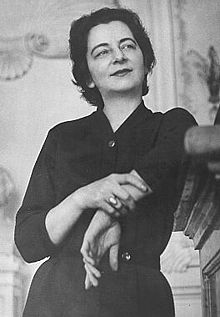Prominent Poles
Grazyna Bacewicz, composer, violinist.

Born: 5 February 1909, Lodz, Russian partition of Poland (presently Poland)
Died: 17 January 1969, Warsaw, Poland
Early days. Her father Wincenty and her brother Vytautas, also a composer, identified themselves as Lithuanians and used the last name Bacevicius; her other brother Kiejstut identified himself as Polish. Her father gave Grazyna her first piano and violin lessons. In 1928 she began studying violin, piano and composition at the Warsaw Conservatory. She graduated in 1932 as a violinist and composer. She continued her education in Paris, having been granted a stipend by Ignacy Jan Paderewski to attend the Ecole Normale de Musique, and studied there in 1932-33 composition and violin). She returned briefly to Poland to teach in Lodz, Poland, but returned to Paris in 1934 in order to continue her studies.
Career. After completing her studies, Bacewicz took part in numerous events as a soloist, composer, and jury member. From 1936 to 1938 she was the principal violinist of the Polish Radio Orchestra. This position gave her the chance of hearing a lot of her own music. During World War II, Grażyna Bacewicz lived in Warsaw, continued to compose, and gave underground secret concerts. Bacewicz was married in 1936, and gave birth to a daughter, Alina Biernacka, a recognized painter. After the war, she took up the position of professor at the State Conservatory of Music in Lodz. At this time she was shifting her musical activity towards composition, tempted by her many awards and commissions, and it finally became her only occupation in 1954 after serious injuries in a car accident.
Compositions Many of her compositions feature the violin. Among them are seven violin concertos, five sonatas for violin with piano, three for violin solo (including an early, unnumbered one from 1929), a Quartet for four violins, seven string quartets, and two piano quintets. Her orchestral works include four numbered symphonies (1945, 1951, 1952, and 1953), and a Symphony for Strings (1946).
Prizes, awards.1933: First prize at the Society of Composers, "Aide aux femmes libres de Professions" in Paris for the Quintet for Wind Instruments, 1936: Second Prize at the composition competition of the Society for Polish Music Publishing Trio For Oboe, Violin and Cello, an honorable mention for her Sinfonietta for String Orchestra; 1949: Second prize (no first awarded) in the Composition Competition. Frederick Chopin, organized by the Polish Composers' Union in Warsaw for the Piano Concerto; 1951: First Prize at the International Composition Competition in Liege for String Quartet No. 4; 1956 Second Prize at the International Composition Competition in Liege for String Quartet No. 5; 1960: III deposit at the UNESCO International Rostrum of Composers in Paris for Music for strings, trumpet and percussion; 1965: Prize of the Belgian Government and the gold medal at the International Competition for Composers in Brussels for Violin Concerto No. 7.
In addition, Bacewicz received awards for lifetime achievement. These included the Order of the Banner of Work Class II (1949) and class I (1959), Order of Polonia Restituta Cavalier (1953) and Commander's Cross (1955), and the 10th Anniversary Medal of the Polish People's Republic (1955). On the centenary of her birth, Polish Post issued a stamp, with a portrait of the artist.
This article uses mostly slightly modified material from the Wikipedia article "Grazyna Bacewicz." Text is available under the Creative Commons Attribution-ShareAlike License:
Wikipedia
Other sources:
Sonata Nr.2
Quartet for 4 violins
Return to home page:
Prominent Poles
